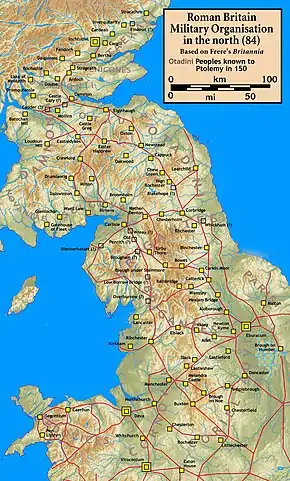Blatobulgium
Blatobulgium was a Roman fort, located at the modern-day site known as Birrens, in Dumfriesshire, Scotland.

Name
Blatobulgium is recorded in the Antonine Itinerary. The name derives from the Brittonic roots *blāto- 'bloom, blossom' or *blāto- (from earlier *mlāto-), 'flour' and *bolgo-, 'bag, bulge'. The name may mean 'flowery hillock' or 'flowery hollow'. However, as there are granaries at the fort, Blatobulgium may be a nickname meaning 'Flour Sacks'.[1]
_Roman_Fort_-_geograph.org.uk_-_2177289.jpg.webp)
History
The fort formed the northern terminus of the Roman-era Watling Street (using an extended definition of this road), or more simply Route 2 of the Antonine Itinerary. It was located in the territory of the Selgovae.
Birrens was first occupied in the Flavian period from AD 79 onwards, when its internal buildings were presumably of timber. Under Hadrian, soon after AD 122, a new fort was constructed whose central buildings were probably of stone. However the visible fort and its internal buildings date from the Antonine period around AD 142. They were destroyed perhaps by enemy action around AD 155, but the replacement stone buildings in the second Antonine period dating to AD 159 onwards were of much poorer quality. Occupation lasted until about AD 180-84. There appear to be no finds later than the Antonine period.
Finds
There have been more inscribed and sculptured stones found at Birrens than anywhere else in Scotland.[2] An altar stone dedicated to the Celtic goddess Ricagambeda was found at Birrens.[3]
References
- Rivet, A. L. F.; Smith, Colin (1981) [1979]. The Place-Names of Roman Britain. London: Book Club Associates. pp. 268–269.
- See also Rivet, A. L. F.; Jackson, Kenneth (1970). "The British Section of the Antonine Itinerary". Britannia. 1: 69. JSTOR 525833.
- The interpretations of the name are summarised by James, Alan G. (2014). The Brittonic Language in the Old North: A Guide to the Place-Name Evidence (PDF). Volume 2: Guide to the Elements. pp. 39, 42. Archived from the original (PDF) on 2014-09-11.
- Keppie, Lawrence (1994). "ROMAN INSCRIPTIONS AND SCULPTURE FROM BIRRENS: A REVIEW" (PDF). Transactions of the Dumfriesshire and Galloway Natural History and Antiquarian Society. 69: 35–51. Archived from the original (PDF) on 10 July 2018. Retrieved 9 July 2018.
- Hunter, Fraser; Carruthers, Martin. "ScARF Summary Roman Presence Report" (PDF). Scottish Heritage Hub. Retrieved 28 April 2018.

